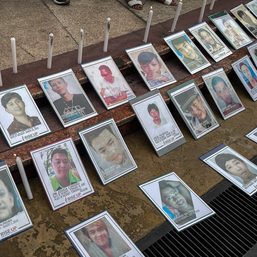SUMMARY
This is AI generated summarization, which may have errors. For context, always refer to the full article.
![[Just Saying] A reawakened Supreme Court?](https://www.rappler.com/tachyon/2024/05/reawakened-supreme-court-may-21-2024.jpg)
Four years ago, disappointed with the Supreme Court decisions on the Marcos burial, Martial Law, former president Gloria Macapagal Arroyo’s acquittal, and the former chief justice Maria Lourdes Sereno’s ouster cases, I titled my Rappler column: “Is the Supreme Court truly a check on executive power?” and said:
When I was a first year law student at the Ateneo, we read Justice Oliver Wendell Holme’s “Path of the Law.” The following quote made a lasting impression on me:
“The rational study of law is still to a large extent the study of history. History must be a part of the study, because without it we cannot know the precise scope of rules which it is our business to know. It is a part of the rational study, because it is the first step toward an enlightened skepticism, that is, towards a deliberate reconsideration of the worth of those rules.”
In brief, Supreme Court justices must judge transcendental cases with the lens of decency and history. They should not be mere pedantic technicians devoid of any nuance and afraid of jolting the “powers that be” from their unconstitutional ways.
Now, the Supreme Court appears to firmly assert its constitutional role of checking the abuses of Congress and the executive. It is a welcome development.
On June 27, 2023, the Supreme Court in Macalintal vs. Comelec et al (G.R. No. 263590) declared unconstitutional Republic Act No. 11935 designed to postpone the barangay election. Firmly, the highest tribunal ruled that “Congress exercised its constitutionally granted authority and judgment in a patently gross manner as to amount to an evasion of positive duty.” Congress was rebuked and, indirectly, the President, who signed the law.
Then on April 3, 2024, the Supreme Court issued a press release on its decision in Trillanes vs. Medialdea (G.R. No. 241494, 256660 & 256078) declaring unconstitutional former president Duterte’s revocation of former senator Sonny Trillanes’ amnesty for violation of the latter’s constitutional right to due process. The Supreme Court “reaffirmed that neither the Government nor any of its officials, including the President, are above the law.”
And in the Deduro vs. Vinoya decision (G.R. No. 245753) promulgated on July 4, 2023, for the first time, the Supreme Court declared “that red-tagging, vilification, labelling, and guilt by association constitute threats to a person’s right to life, liberty, or security,” making their commission valid grounds for the issuance of the Writ of Amparo – a remedy against extrajudicial killing and enforced disappearance or any threat thereof.
Lest we forget, there is one more important case which must be decided judiciously to prove a functioning constitution. This is the libel case against Maria Ressa, the Philippine’s first Filipino individual Nobel Peace Prize laureate, now pending with the Supreme Court en banc.
That case’s notoriety is inevitable. Like it or not, Maria Ressa has attained a global stature synonymous with the struggle for the truth, freedom of the press and individual liberty.
Her situation is where I believe Justice Oliver Wendell Holmes’ words nuancing and imbuing law with history becomes relevantly significant.
I will not discuss the nitty-gritty of the case, the evidence presented nor the arguments proferred. I would only say that, in its resolution, the historical backdrop of Maria Ressa’s travails must be taken into account: the many cases filed against her, the numerous bails posted, a conviction on appeal, so many verbal abuses coming from high sources, including the accusation of “fraud” by the former president Duterte, and the threat of closure of Rappler.
Also, all these occurred or, at the very least commenced, during one period in time – during the term of the powerful Duterte administration whose leader, as reported by various news-platforms, once likened the Constitution to “toilet paper” and also publicly said “just because you’re a journalist you are not exempted from assassination, if you’re a son of a bitch.”
There should also be an understanding of why press freedom has an exalted position in the hierarchy of our constitutional liberties. The reason was not arbitrary or esoteric. It was a rightful reaction to one of the darkest periods in our history – the Marcos dictatorship when many journalists and media people – such as Teodoro Locsin Sr., Chino Roces, Luis Beltran, Maximo Soliven, Amado Doronila, Juan Mercado, Eugenio Lopez Jr. and others – were baselessly arrested simply because they were perceived to be not aligned with the dictator and dared to expose government abuse – which, at that time, also included extrajudicial killings much like what Maria Ressa and Rappler have been reporting. The judiciary then was complacent and complicit, if not disgustingly subservient. The result was executive abuse.
Perhaps the experiences of these journalists may mean little now to some of our citizens or even to a number of the country’s judges or justices, but, undeniably, their experiences are standing testaments to the horrors of press curtailment. They represent the struggles for press freedom necessitating its constitutional protection.
That is how Maria Ressa’s case should be appreciated and scrutinized. It cannot be treated as merely an ordinary legal suit. Its resolution – regardless of the result – will show whether or not our institutions are serious in respecting and implementing the lofty ideals enshrined in our Constitution and the historical lessons that led to its promulgation. The impact will be deep, both locally and internationally.
And so, again the Supreme Court will be placed in the limelight. Even though the trend seems to be leaning towards the protection of constitutional rights, I still await the final verdict with bated breath. For in the end, those men and women in their black robes are also fallible and imperfect human beings still susceptible to varied and subtle forms of influence.
We can only take solace in what then-chief justice Claudio Teehankee, quoting former US chief justice Earl Warren said: “Justices and judges must ever realize that they have no constituency, serve no majority nor minority but serve only the public interest as they see it in accordance with their oath of office, guided only by the Constitution and their own conscience and honor.”
And how much the chief justice and the associate justices of the Supreme Court will decide the Maria Ressa case factoring in our country’s historical struggle for a free press remains to be seen. Let us see. – Rappler.com
Mel Sta. Maria is former dean of the Far Eastern University Institute of Law. He teaches law at FEU, the Ateneo School of Law, the University of Sto. Tomas, Pamantasan ng Lungsod ng Maynila, University of Makati, and Manuel L. Quezon University. He also hosts shows on both radio and YouTube, and has authored several books on law, politics, and current events.
Add a comment
How does this make you feel?

![[The Slingshot] A Duterte and Bato cop named Patay](https://www.rappler.com/tachyon/2024/06/tl-lito-patay.jpg?resize=257%2C257&crop=322px%2C0px%2C720px%2C720px)






There are no comments yet. Add your comment to start the conversation.